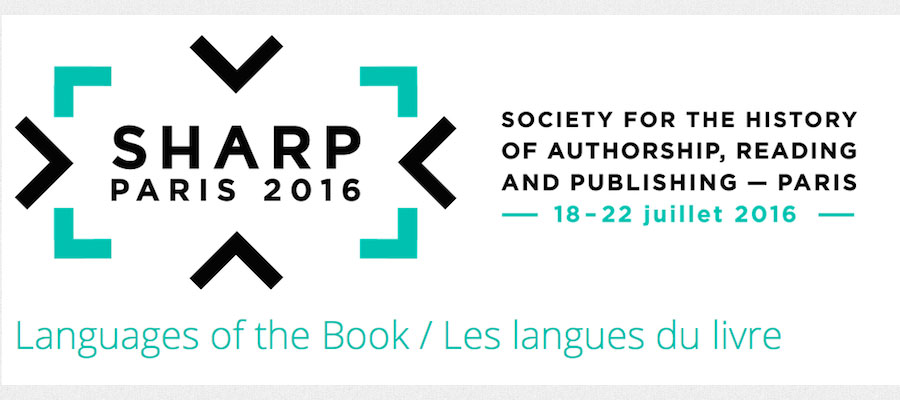Languages of the Book / Les langues du livre, 24th Annual Conference, Society for the History of Authorship, Reading & Publishing (SHARP), Paris, July 18–21, 2016
The 24th annual conference of the Society for the History of Authorship, Reading & Publishing (SHARP) will be held in Paris, France from Monday 18 July to Thursday 21 July 2016 (Friday 22: excursion). The keynote lectures, panels, and most events will take place at the Bibliothèque nationale de France. The conference will also feature excursions to sites in and around Paris of interest to book historians.
Anatole France once described the Babel of books as a library in which “the books all speak at once and in all tongues.” The conference theme, “Languages of the Book,” is to be understood in the broadest possible sense. One of its goals is to examine manuscript, print and digital cultures in relation to what Pascale Casanova has called the World Republic of Letters. Suitable topics include multilingual books, majority and minority languages, and the circulation of texts across national borders, as well as the presence, within a particular country, of foreign works in their original language or in translation. The language of the book as a material object provides another approach: what does a book’s materiality communicate about its conditions of production and the messages encoded by its author and publisher? Participants could also examine the interaction of written and spoken languages (such as in audio books), or the interplay of text and image in illustrated books, comics, and graphic novels. The theme may also provide a new way to think about digitization as a new language for books. How does digitization change the writing process, the structure of the text, and the way it is read? In what ways do e-books alter how works are produced, distributed, and received? A third set of questions involves the languages used by historians of the book. What theoretical assumptions and disciplinary premises anchor our approaches? Is there a language common to all book historians?
The conference theme may be approached from several angles, including, but not limited to:
1. Languages and translation
- The circulation of works across linguistic and cultural borders; translation flows
- Public policies and publishing strategies with respect to translation
- The role and status of translators
- The presence of foreign-language works and translated works in a given country (libraries, book stores, private collections, etc.)
2. Languages of the book
- Digitalization: a new language and new modes of reading?
- The language of paratexts and epitexts
- Genre-specific languages
- Accessing the written word: overcoming barriers to reading
- The language of the law and book-trade regulations
3. Languages of the book trade and book history
- Book trade sociolects
- Dialogue and tensions among writers, publishers, editors, agents, and other participants in print culture
- Theoretical assumptions and disciplinary concerns: do historians of books and reading all speak the same language?
- The impact of digitization on book history research
The above list of topics is not exhaustive. The conference also welcomes proposals for papers and panels on any topic related to the history of the book, but preference may be given to those that engage in some way with the conference theme.
Doctoral students are especially encouraged to apply; there will be dedicated workshops for them to present their dissertation research and receive feedback from experienced SHARP members. The conference will also feature a “digital projects showcase” in which individual researchers or teams may present initiatives that use new technologies to advance research in the history of the book (see the submission guidelines below)
Conference languages: French and English
Membership in SHARP is required for all presenters. Membership is not necessary for the submission of a proposal, but those whose proposals are accepted must join SHARP or renew their membership for 2016-2017 before registering for the conference.
Travel grants
SHARP is able to provide a limited number of travel grants to graduate students and independent scholars. If you wish to be considered for such a grant, please state so when submitting your proposal.
